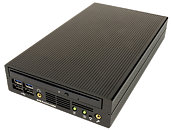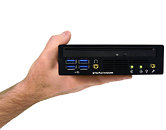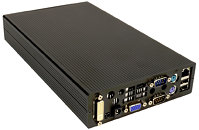Thursday, March 21st 2013
Stealth Introduces Mini PC with Core "Ivy Bridge" Processor
Stealth.com Inc. (Stealth Computer) a leading ISO 9001 manufacturer of industrial rugged computers and peripherals has released a new powerful small form factor PC. The new Stealth Extreme Power model LPC-480 mini PC is Stealth's most powerful small form factor computer to date continuing their history of delivering small high performance computers for demanding applications.
The LPC-480 outperforms other small sized PC systems due to the integration of the latest Intel 3rd Generation Core i7 mobile processors. The LPC-480 ships with a standard Intel i7 Processor 3610QE CPU exceeding the performance of computers many times its physical size. The LPC-480 LittlePC measures an amazing 5.7" x 9.9" and less than 1.65" in height or about the size of a hard cover novel."Our new Stealth Model: LPC-480 is the most powerful and technologically advanced small form PC we have introduced to date. Our full featured machine utilizes the new third generation Intel Core i7 mobile processors and we truly believe it delivers the most processing power of any small form-factor computer available on the market today." stated Ed Boutilier CEO of Stealth.com Inc.
The LPC-480 small mini PC features a multitude of I/O connectivity built into its impressively small design such as; 4-USB 3.0, 2-USB 2.0, 1-DVI-D, 1-VGA, 1-Gigabit LAN, 2-RS232 Serial and Line In/Out Audio ports.
The LPC-480 supports up to 16GB in DDR3 memory and is available with a 2.5" mobile hard drive or Solid State Drive (SSD) in various capacities. A slim DVD-RW/CD-RW optical disk drive comes standard with an optional Blu-ray burner available.
Systems are compatible with Microsoft Windows 7, 8, XP, Linux, etc and can be custom configured to meet the exact needs of the end user. Stealth's new LPC-480 Small Form PC is currently shipping with configurations starting from $1,325.00 USD.
The LPC-480 outperforms other small sized PC systems due to the integration of the latest Intel 3rd Generation Core i7 mobile processors. The LPC-480 ships with a standard Intel i7 Processor 3610QE CPU exceeding the performance of computers many times its physical size. The LPC-480 LittlePC measures an amazing 5.7" x 9.9" and less than 1.65" in height or about the size of a hard cover novel."Our new Stealth Model: LPC-480 is the most powerful and technologically advanced small form PC we have introduced to date. Our full featured machine utilizes the new third generation Intel Core i7 mobile processors and we truly believe it delivers the most processing power of any small form-factor computer available on the market today." stated Ed Boutilier CEO of Stealth.com Inc.
The LPC-480 small mini PC features a multitude of I/O connectivity built into its impressively small design such as; 4-USB 3.0, 2-USB 2.0, 1-DVI-D, 1-VGA, 1-Gigabit LAN, 2-RS232 Serial and Line In/Out Audio ports.
The LPC-480 supports up to 16GB in DDR3 memory and is available with a 2.5" mobile hard drive or Solid State Drive (SSD) in various capacities. A slim DVD-RW/CD-RW optical disk drive comes standard with an optional Blu-ray burner available.
Systems are compatible with Microsoft Windows 7, 8, XP, Linux, etc and can be custom configured to meet the exact needs of the end user. Stealth's new LPC-480 Small Form PC is currently shipping with configurations starting from $1,325.00 USD.



26 Comments on Stealth Introduces Mini PC with Core "Ivy Bridge" Processor
Lets get one fact perfectly clear. This computer is not for gaming in any way, shape or form... so don't treat it as such. :shadedshu
Second of all, as a system admin you would be surprised at how many devices you can have (mostly UPS devices,) that still use COM for communicating UPS info to a server. COM is an old standard but it works and has been around for a long time. I'm sure half of you would complain if it was a USB-COM adapter as well.
This machine has a lot of CPU power for it's form factor as well as the fact that it uses a mobile extreme edition CPU. The CPU alone has a market value of > 400 USD, so that's a large portion of the price. You're also going to be hard pressed to find this kind of performance with a 45-watt TDP.
All in all, this is designed for a low form factor, low power, high performance machine. It is not designed for gaming and is most likely designed for business and typical usage.
Plenty of people still use optical drives. Just because you don't doesn't mean other don't as well.
This is not geared towards your typical consumer, this geared towards business.
A 10-inch tablet for a 1/3 of the price probably is at least 1/3 as capable as well... Are you really going to compare a tablet with an ARM processor to an i7? That's comparing apples and oranges and is a terrible comparison.
The point I'm making is if you need something this powerful, you're not going to be looking at the surface considering the two products are targeting two different markets. You don't buy a Celeron if you're going to be gaming and you don't buy an i7 if you're only going to be browsing.
This targets a different audience than the Surface Pro so your argument is moot.Machines that are connected to medical equipment typically aren't going anywhere and if they are, they're on a cart with all the other instruments it needs. You're also not going to be using Windows 8 for that kind of thing so the surface is already off the table for half of its usefulness. I could see this being useful for Hospitals. The CPU supports vPro and remote management so it would make sense for wide-scale deployment as well. Space and time costs money too.
But it's not useless, as he pointed out.
If it's useless to you it doesn't mean it's useless to the rest of the world.
Too many of you are extremely narrow minded and without broad horizons when it comes to the uses of computers, and when it comes to how a manufacturer prices computational devices according to their markets and use.
(don't say you knew that already, because if you did, you wouldn't have posted a response to the original story).
:rolleyes:
I can see this being in a lot of places but nowhere a regular consumer would see.
Not to say embedded systems aren't more common but it's no more or less reliable than an embedded system, it really depends on how you implement it. Not what you implement it on.
I'm getting the irking feeling that you don't know what you're talking about.
just as aquinus and other people here stated, i don't think you should bash a product just because you don't like it or have no use for it (in this case the components and I\O choices)
just stating my opinion on this.
Now onto the use, for instance I support a company that has a sales team of 30, it's very often they have between 20-30 browser windows open, word, outlook, excel, access, inventory management, accounting, some of them run virtual machines to use old proprietary software they need... This is not something you want to do on an i3 with 4gb of ram. A lot of times companies like this can also get strapped for space due to rapid expansion, small form factor comes in handy, let alone they take up less space for having an extra few on hand for when one fails, drop it in place done back in business in 10 minutes.
Lastly, why don't they want laptops? Because then they have to deal with laptop problems and employee issues like them wanting to take them home, broken screens because some idiot dropped a book on it, the list is endless.
These look sweet, I might take a closer look at them, however I wish they had 2 (or more) DVI/DP/HDMI.